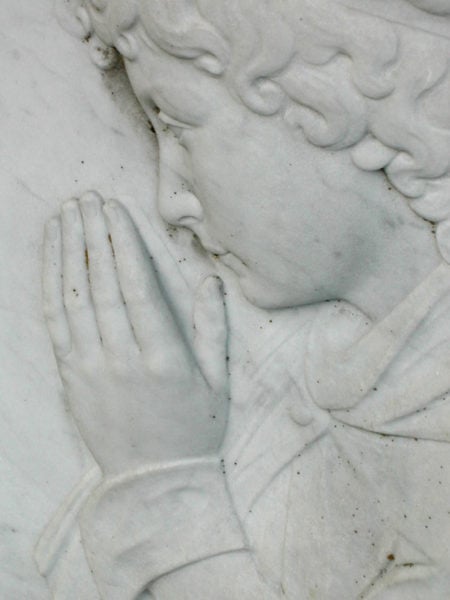Have you ever been accused -- or felt the silent insinuation of it at least -- of being or acting holier than thou?
 http://morguefile.com/search/morguefile/5/praying/pop
http://morguefile.com/search/morguefile/5/praying/pop
A recent Tweeter called out my holy, responding to a blog post of mine, noting that I'm Catholic and obviously believe I'm also "infallible, smarter and certainly closer to God than the pope."
Writing about faith and living out a life of faith can set us up for these sorts of sideways glances, and I've come to -- well mostly -- accept it's part of the gig.
But I think it's important to explore what's underneath these sentiments, because I sense something very raw and real just below the surface.
I don't have to look far. I can look inside my own heart, and how I've felt in moments when I've been around friends I've felt inadequate against. Yes, at times, I've looked at certain friends and thought, "They are so much more faithful than I am. They do this or that, after all, and I don't, and that's an obvious sign of holiness. So obviously I'm lacking."
Recently, I admitted to one of my dearest friends my admiration over her commitment to daily Mass, and how I'd like to make that same commitment but just can't seem to make it work out.
Apparently picking up on my underlying thoughts of, "Your daily Mass commitment makes your faith life a step above mine," she responded, "I just know that if I didn't, I'd be lost."
Her brief response set things right in my mind. Seeing her daily Mass attendance as coming more from her recognition of her dependence on God, rather than a sign to the world that she's somehow holier than others, reordered my thinking. Her Mass commitment helps her cope with life and her own deficiencies; she feels she'd be lost without that regular infusion of Christ.
[Tweet "When motives are known, and the heart is made visible, everything changes. @peacegardenmama"]
It was a reminder to me that when motives are known, and the heart is made visible, everything changes.
My own articulations of my quest for God similarly have not come from a belief that I am somehow better than others. My failings are numerous and frequent, small and big. Daily, I'm trying to do better. But as I discover more and more the richness of living out a life of faith, I want others to taste the good things God wants to offer us, especially the redeeming love of Christ. I know I need a savior and I've become convinced He is what holds me together.
So when I write about faith and the hoped-for ideals of it, I write to myself most of all. If my sharing inspires others as others have inspired me, it becomes a double blessing.
It's okay for us to feel at times that we are deficient in some areas. This can motivate us toward the good. We get into trouble, however, when we stay stuck in these feelings of inadequacy.
Perhaps we can move, instead, in another direction, reminding ourselves: 1) My feeling of discomfort tells me I have work to do. 2) This person is not trying to make me uncomfortable or belittled. She's just groping for God like I am. 3) It's okay to allow myself to be inspired, giving myself permission to consider putting her actions into practice in my own life at some point, or realizing God might have something else in mind for me to grow more in love with him.
It's a discovery, always, but we impede ourselves by clinging to the "She's holier than thou" or "He's holier than thou." If anything, this just holds us back from finding God's merciful embrace more quickly. In the end, my actions and words are, more than anything else, manifestations of my own desperate need for God -- my humanity laid bare.
We are not here to compete, or make each other feel less than. We're here to journey together, to learn from one another, to be broken and groping together.
Q4U: Have you ever been accused of being 'holier than thou,' or accused another of it? How did you respond?
Copyright 2016 Roxane Salonen
About the Author

Roxane Salonen
Roxane B. Salonen, Fargo, North Dakota (“You betcha!”), is a wife and mother of a literal, mostly-grown handful, an award-winning children’s author and freelance writer, and a radio host, speaker, and podcaster (“ Matters of Soul Importance”). Roxane co-authored “ What Would Monica Do?” to bring hope to those bearing an all-too-common cross. Her diocesan column, “ Sidewalk Stories,” shares insights from her prolife sidewalk ministry. Visit RoxaneSalonen.com


.png?width=1806&height=731&name=CatholicMom_hcfm_logo1_pos_871c_2728c%20(002).png)
Comments